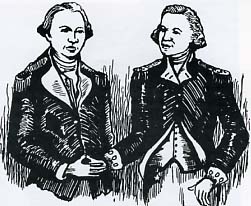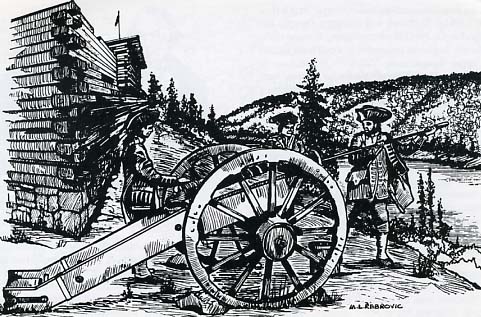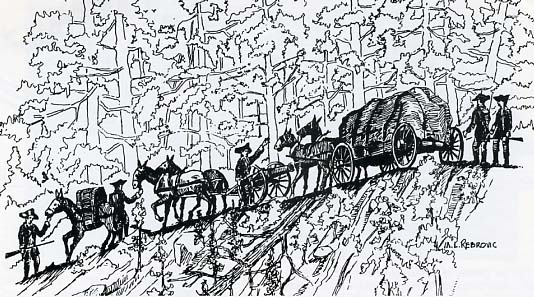
Click Here to Return to Milestones

On the grounds of the Monroe County General Hospital in East Stroudsburg, Pennsylvania, a single bronze plaque pays tribute to two Daniel Brodheads. The one was the "founder of (Dansbury) East Stroudsburg", settling on a 650 acre manor in this vicinity. The other was his son "General Daniel Brodhead of Revolutionary fame". When the elder Daniel Brodhead and his wife Hester brought their family to this area in 1738 from Ulster County, New York, little Daniel was not quite two years old. Brothers John, Charles, and Garret were with them. Brother Luke and sister Ann were born to the family later. The Brodheads invited Moravian missionaries to establish a station here. Other settlers soon made their homes nearby. The elder Daniel died in July 1755 in Bethlehem where he had gone for medical attention. His body was interred in the Moravian cemetery there. In December of that year, nineteen-year-old Daniel helped his family and neighbors to defend their homes against an attack by the Delaware Indians under Chief Teedyuscung.
In 1775, when Americans were taking up arms in behalf of their self-government and eventual independence from the British empire, Daniel, Garret, and Luke were among the earliest volunteers for military service. All three sustained wounds and suffered many hardships; but it was Daniel who earned a place of distinction in the Revolutionary War.
Daniel Brodhead and his wife Elizabeth Depue had moved from their Dansbury community to Berks County in 1770. There Daniel operated a grist mill and accepted an appointment as deputy-surveyor for the colony of Pennsylvania. The British Coercive Acts of 1774 aroused Daniel Brodhead's indignation. Because the Boston Port Act crippled the economic life of Boston, Paul Revere traveled to Philadelphia to seek sympathy and assistance.
Philadelphia leaders formed a committee of correspondence to circularize all Pennsylvanians in behalf of the Bostonians. This committee called upon each county to send delegates to a protest congress in Philadelphia in July, 1774. Daniel Brodhead was on the Berks County delegation; and was appointed to the convention committee for drawing up a set of instructions to the Pennsylvania colonial legislature. On that committee with Brodhead were other young men destined to be among the Founding Fathers of the new nation - John Dickinson, Joseph Reed, and James Wilson.
In July, 1776, the new state legislature approved a conmission of lieutenant colonel for Daniel Brodhead with authorization to raise a rifle company. Thus began a military career that was to test the patriotism and character of Daniel Brodhead. He rose in rank and responsibility over the ensuing seven years of war. He endured the trials of leadership until an independent United States of America was assured.
Daniel Brodhead's first military assignment took him to Marcus Hook on the banks of the Delaware River below Philadelphia. There he supported Pennsylvania's river fleet in turning back two British ships sailing towards Philadelphia. Brodhead's outfit then hurried across New Jersey to join General George Washington's forces attempting to protect New York city from British landing operations. Brodhead fought in the battle of Long Island; and took charge of the battalion when its leader, Samuel Miles, was captured by the British.
The Pennsylvania Council of Safety, directing the Pennsylvania forces, took note of Brodhead's responsible leadership under fire and recommended a salary increase as well as an official appointment to the command of the 4th Battalion. The legislature approved both recommendations.
The Continental Army's 8th Pennsylvania Regiment with which Daniel Brodhead was to be associated throughout most of the war was being organized while he was in New Jersey and New York. The Continental Congress originally authorized this regiment for the defense of the western frontier. It was recruited in western Pennsylvania; but was rushed to the New York area in the winter of 1776-1777. When Colonel Aeneas Mackey, commander of the Regiment died soon after arriving in New Jersey, Daniel Brodhead was designated his successor. The 8th Pennsylvania Regiment stayed in the East for a year, including a winter of hardships at Valley Forge where a plaque now honors Brodhead as its commander.
Working closely with General Washington throughout 1777, Colonel Brodhead carried out frequent assignments as a court-martial chairman; and led his regiment to the defense of Philadelphia. The 8th Regiment belonged to the Second Brigade commanded by General Anthony Wayne; and suffered through the fighting at Brandywine, Paoli, and Germantown. Out of respect to Brodhead's service, Washington recommended his promotion from lieutenant colonel to full colonel; and Congress approved.

In June, 1778, Colonel Daniel Brodhead was ordered to lead the 8th Pennsylvania Regiment across the mountains to Fort Pitt for service on the frontier. Their ultimate objective was the destruction of the British posts at Detroit and Niagara. Their immediate function was to protect the frontiersmen from Indian forays. At this time General Lachlan McIntosh was replacing General Edward Hand as the Fort Pitt commandant. Enroute to the west, the 8th Regiment responded to a call from settlers in the upper Susquehanna Valley in the vicinity of Muncy, Nescopek, and Penn's Valley, to disperse rampaging Indians. After a month of this diversionary activity, the Regiment regrouped at Carlisle on August 13 and arrived at Fort Pitt on September 10.
Colonel Brodhead joined General McIntosh in starting the advance towards Detroit. They built a fort at the mouth of the Beaver River on the Ohio, naming it Fort McIntosh. Farther on, they erected Fort Laurens on the Tuscarawas River in present day Ohio. Stopping for the winter, Brodhead was stationed at Fort McIntosh. Before the winter's end, General McIntosh resigned his command at Fort Pitt; and Washington named Colonel Brodhead to succeed him.

"Reducing Detroit" was to have top priority in Brodhead's plans. With General Washington's encouragement and advice, he carried on an extensive intelligence campaign to get an accurate picture of Detroit. Indian relations took up much of his time, testing his diplomatic skill and his military strategy. Brodhead hoped to secure the frontier and prepare the way for a safe march against Detroit by cultivating the goodwill of the Delawares and by enlisting the cooperation of the Moravian missionaries in the Ohio Country. In August, 1779, Brodhead led a punitive expedition into the hostile Seneca country of northwestern Pennsylvania. It paralleled General John Sullivan's campaign in north-central Pennsylvania. In October Congress passed a resolution of thanks "to Colonel Daniel Brodhead and the brave officers and soldiers under his command for executing the important expedition against the Mingo and Muncy Indians."
There were never enough supplies nor armed men available to Colonel Brodhead to risk the 300-mile march through the wilderness to Detroit. Imperatives of the war effort in the East and the South prevented Washington and the Board of War from providing more than a minimum of security on the frontier. Meanwhile, the state of Virginia under Governor Thomas Jefferson decided to prepare their own expedition against Detroit. Colonel George Rogers Clark would command it. Jcfferson begged Washington to support Clark with a measure of Brodhead's supplies and manpower. Washington instructed Brodhead to use his own judgment about sharing his resources with George Rodgers Clark. The security of his own position had to be maintained. The Clark expedition foundered on the Ohio River. Daniel Brodhead was recalled from Fort Pitt before he could launch his own campaign against the British posts.
General Washington removed Colonel Brodhead from his command in September, 1781, pending an investigation into a subordinate's charges of malfeasance and misfeasance of his office. A court-martial trial in Philadelphia in February, 1782, acquitted Colonel Brodhead of all eight formal charges. Washington had already reassigned Brodhead to the I st Pennsylvania Regiment. Shortly thereafter, Brodhead was promoted to the brevet rank of brigadier-general. His military service ended when his regiment was disbanded in 1783.
Colonel Brodhead had seen very little of his family during the war. A son, Daniel, saw military service until captured by the British. After release, he entered business in Philadelphia. A daughter, Ann Garton, married Casper Heiner of Reading in 1779. At the war's end, Brodhead returned to Berks County. In 1787 he was among the five Berks county representatives elected to the state legislature for a two-year term.
Daniel Brodhead was a responsible member of the General Assembly's important Ways and Means Committee. He also served on the Committee on Accounts and several ad hoc committees. Brodhead's legislative voting record exhibited a quality of progressivism in his hopes for the future of Pennsylvania and the new nation. He supported measures for the self-government of the University of Pennsylvania; and voted to liberalize the penal laws and the regulations on theatres; and was interested in public assistance to the poor.
Daniel Brodhead attained his highest civil position in 1789 when the State Executive Council elected him surveyor-general. He took charge of the Pennsylvania Land Office on the threshold of a decade of unparalleled activity. Thomas Mifflin, elected Governor of Pennsylvania under the new constitution of 1790 (and reelected in 1793 and 1796), continued Daniel Brodhead in this high position. When Thomas McKean won the governorship in 1799 he made room for many of his own appointees by asking the incumbents to resign. Brodhead left office in the spring of 1800.
In administering the public lands, Surveyor-General Daniel Brodhead had to carry out the laws affecting land grants to war veterans, the survey of lands relinquished by Indians, and regulations affecting land company speculation. The fee system by which deputy surveyors worked, the interests of state legislators, and the pressures from public figures in the land companies, exposed the Surveyor-General to charges of personal favoritism and an undisciplined staff. When Brodhead and Comptroller-General John Nicholson indulged in extensive land purchases for speculative purposes, they became the subjects of legislative investigation.
Neither office space nor clerical help kept pace with the Land Office business. Critics blamed Daniel Brodhead for shoddy administrative practices and the related delays and disorders in the keeping of land records. Governor Mifflin repeatedly requested legislative appropriation increases.
Throughout the 1790's Daniel Brodhead resided in Philadelphia where he mingled with the top echelons of state and national government (the national capital was located in Philadelphia in the 1790's). In 1788, following the death of his wife, Daniel Brodhead married Rebecca Mifflin, widow of Samuel Mifflin. Samuel's brother Thomas was soon to be elected governor of Pennsylvania. Upon resigning his surveyor-general office in 1800, the Brodheads retired to Milford, Pennsylvania. He died there in the summer of 1809. His grave has not been identified; but the citizens of that community erected a monument to his memory in 1872 in the Milford Cemetery.
